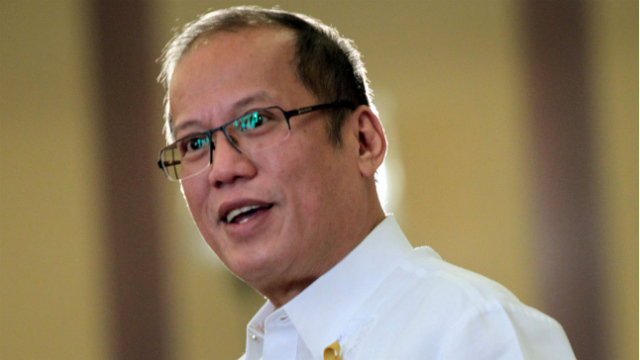SUMMARY
This is AI generated summarization, which may have errors. For context, always refer to the full article.

MANILA, Philippines – The President fired no cannons against China on Wednesday, October 23, when pressed if, by a recent a statement, he meant China should leave disputed shoals in the West Philippine Sea (South China Sea).
President Benigno Aquino III softened his tone. He declined to explicitly tell China to back off from the disputed Panatag (Scarborough) Shoal, the site of a Manila-Beijing standoff in 2012, as well as the Ayungin (Second Thomas) Shoal.
The Philippines, after all, has brought its dispute with China to an international tribunal, Aquino told foreign correspondents in a forum Wednesday.
He said his country, too, is helping craft a Code of Conduct (COC) on the South China Sea, a binding document to ensure peace in what he calls a “sea known by many names.”
“The bottom line is, we are undergoing arbitration. We are pursuing the second track with the COC. And at the end of the day, either or both will seek to clarify everybody’s entitlements with regard to this body of water,” Aquino said during the annual Presidential Forum of the Foreign Correspondents Association of the Philippines.
The President was explaining a statement he made at the Association of Southeast Asian Nations (ASEAN) Summit in Brunei last October 9.
Back then, Aquino urged ASEAN and China to keep the “status quo,” having crafted the Declaration on the Conduct (DOC) of Parties in the South China Sea, a non-legally binding document, in 2002.
He cited paragraph 5 of the DOC, which states: “The parties undertake to exercise self-restraint in the conduct of activities that would complicate or escalate disputes and affect peace and stability including, among others, refraining from action of inhabiting on the presently uninhabited islands, reefs, shoals, cays, and other features and to handle their differences in a constructive manner.”
No categorical answer
During Wednesday’s forum, a journalist repeated the question: “Your call for a status quo, does it mean that you want China to withdraw from Scarborough?”
Again, the President refused to give a categorical answer. Aquino said, “I think you should study the matter.”
He explained Panatag is 120 miles from Masinloc, Zambales – “clearly” within the Philippines’ exclusive economic zone.
The exclusive economic zone is an area up to 200 NM from a country’s baselines, within which a state has the sovereign rights to explore and exploit, and conserve and manage natural resources, among others.
Aquino said, “If we are supported or upheld by the arbitration, then, that is a clear provision.”
He also noted that both the Philippines and China signed the United Nations Convention on the Law of the Sea, a landmark convention that governs maritime disputes.
“I’m saying that there is a legally-binding document, and if you say that you adhere to international law then you should be abide by the decision as we will abide by the decision,” the President said.
‘Not offensive’
Despite the Philippines’ case against China, recent statements show the President adopting a friendlier tone in discussing the maritime dispute.
During the recent ASEAN Summit, for instance, Aquino said he “tried not to be offensive.” He veiled his criticisms in diplomatic language, and did not explicitly call out China for its territorial incursions. READ: Aquino takes jab at China: ‘Follow the law.’
He said his statements jibed with those of Chinese Premier Li Keqiang, who called for a “South China Sea a sea of peace, friendship, and cooperation.”
“It seemed like walang pinagtatalunan ‘yung sinasabi niya at ‘yung sinabi ko. Baka puwede pang sabihing nag-coordinate kami ng ano ang sasabihin,” he said in an interview with Philippine journalists last October 9.
(It seemed there was no conflict between what he said and what I said. Perhaps we can even say we coordinated on what to say.)
Aquino explained that in referring to the disputed sea, China avoided words such as, “this is ours,” for instance. “Parang hindi belligerent ang tone,” he said. (The tone wasn’t belligerent.)
It has been 10 months since the Philippines filed an unprecedented case against China before the International Tribunal for the Law of the Sea. The tribunal to hear the case first met in July. READ: Hearings on PH, China dispute begin. – Rappler.com
Add a comment
How does this make you feel?
There are no comments yet. Add your comment to start the conversation.